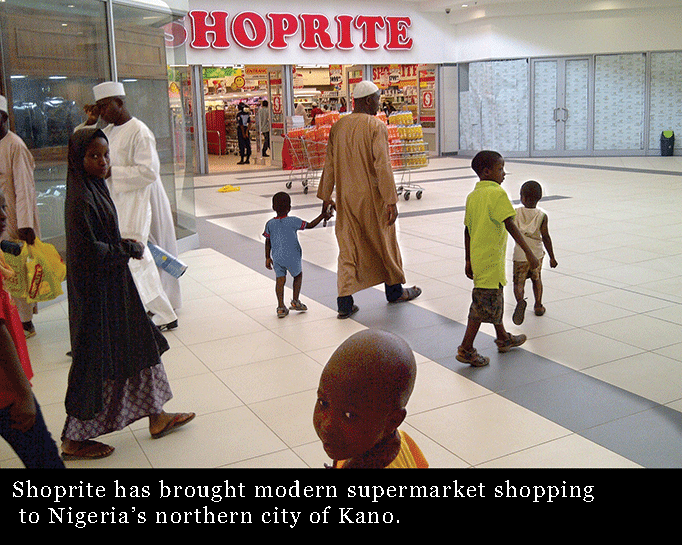
Last year Nigeria’s economy became Africa’s largest, ahead of South Africa, after the government rebased its GDP in response to the United Nations Statistical Commission’s recommendation. Retail developers and retailers are taking note, and shopping malls are going up in such major cities as Aba, Lagos and Port Harcourt, and also in some previously underserved areas. Driving all this development is Nigeria’s sizable consumer base — upwards of 80 million of the country’s 170 million people live near these urban centers — as well as a rising middle class and an oil-fueled economy.
“There are already 8 million households that belong to a rapidly growing consuming class in Nigeria,” said Reinaldo Fiorini, managing partner in that country for McKinsey & Co. “These are the households that are driving the growth of the retail sector in the country.” Fiorini tells SCT that he expects there will be 35 million such consuming households by 2030 in Nigeria. “There may be some volatility and uncertainty in the short term, but the sooner that retailers start to explore the market, the better for them to shape it and enjoy the growth.”
Last March consulting firm A.T. Kearney put out an African retail development index and report to help give global retailers “direction on how and when to enter specific African
countries.” Interestingly, Rwanda heads the list, and Nigeria is second; then comes Namibia, Tanzania and Gabon, with South Africa ranked seventh because of its alleged market saturation. Admittedly, as A.T. Kearney observed, what it defines as “formal” retail — malls, shopping centers and other defined retail spaces — remains in “the nascent stages” in most of sub-Saharan Africa. Nigeria had, for instance, only two malls in 2012, barely 1 percent of the roughly 200-plus in South Africa. A lot of groundwork remains to be done, according to Mirko Warschun, an A.T. Kearney partner and a co-author of the index report.
But like McKinsey, A.T. Kearney is recommending that retailers move quickly into Nigeria, because the country has “rapidly evolving retail dynamics and demographics, with some established retail players and many other global retailers planning entries.” These first movers are set to gain an advantage in establishing their brands and securing loyal customers, the firm asserts. Right now modern retail makes up only a small portion of the marketplace, but “international retailers are moving in as annual per-capita retail sales surpass $1,000,” according to the Kearney report.
Last year, Netherlands-based Spar announced its intention to enter Nigeria. Other foreign retailers in the market include Hugo Boss and South Africa’s Pep and Mr Price apparel chains, according to Euromonitor International.
McKinsey projects that Nigeria’s consumption rate could reach some $1.4 trillion per year by 2030, nearly quadruple its present rate of $388 billion, which would represent an average annual increase of 8 percent.
Nigeria’s market potential is unlimited and relatively immature, according to Japie Swart, head of retail at Resilient Africa, a South Africa–based real estate investment and development firm. Last year Resilient Africa teamed up with Shoprite, also based in South Africa, and with Stanbic IBTC Bank, of Lagos, to develop four malls in the southern part of the country, Swart told The Sun, Nigeria’s leading newspaper, with Shoprite being the anchor tenant at each facility. Resilient Africa, founded in 2002, says on its website that the goal of the partnership is “to develop quality shopping malls in all the dominant metropolitan areas throughout Nigeria, which will provide the public with good retailers and a positive shopping experience in a modern mall environment.”
One of Resilient’s projects is the $58 million Delta City Mall, scheduled to open this month, in Effurun. Resilient says it plans to open the Owerri Mall by this December, the Asaba Mall (by August) and the Benin City Mall (by November). “Wherever we see opportunity, we pursue it,” said Matthew Cheney, Resilient Africa’s Delta Mall project manager, speaking to the Sun. “All of us cannot just focus on the big cities. By doing that, we will be over-supplying the market there, but not tapping the opportunities in the rest of Nigeria.”
Meanwhile, in Abuja, Nigeria’s capital city, with its population of 2.2 million people, Lagos-based Beverly & Sam Properties opened the relatively upscale Purplestone mall this past November to take advantage of the favorable demographics there, according to Lilian Agbakoba, Beverly & Sam’s managing director. Abuja boasts Nigeria’s highest per capita income, with upwards of 68,000 households able to spend in excess of $150,000 annually.
Some 20 global retail chains are active in the country just now, according to McKinsey. After breaking ground in 2005, Shoprite currently operates eight stores there, with plans to open 44 more by 2018. Mr Price and Hawes & Curtis are among the international retailers there too, McKinsey says. With stores now in five shopping centers, Artee Group, which owns the Park ’n’ Shop and Spar brands, is Nigeria’s largest domestic retailer, says A.T. Kearney.
Serious hurdles must be cleared, however, before any outsiders can succeed in Nigeria, Kearney cautions. The market is among the toughest in its index. South Africa’s Woolworths recently pulled out, citing “high rents and duties, supply-chain issues, and marketing difficulties,” notes McKinsey. English may be Nigeria’s official language, but roughly 100 native tongues are spoken across the country, and regionalism is rife. But Nigeria’s GDP is growing at 6 percent annually, nearly a third of that growth coming from wholesale and retail revenue.
“We’ve been in Nigeria for more than 10 years, and we felt that now was the time to tell a different story about Nigeria,” said McKinsey’s Fiorini. “There’s no denying the challenges Nigeria faces. But if they become the only story, we risk overlooking the country’s potential, how to effectively deliver on it, and how companies can explore the opportunity.”
